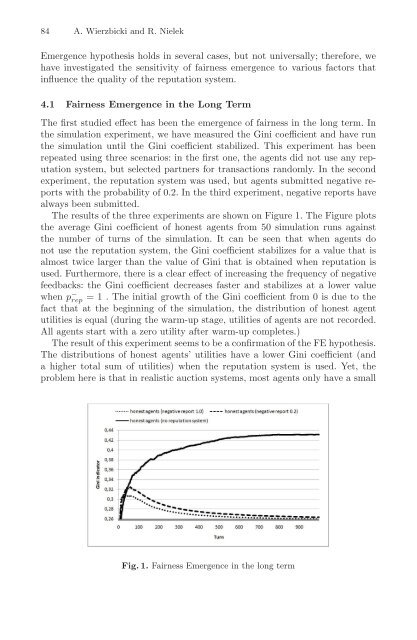Lecture Notes in Computer Science 5185
Lecture Notes in Computer Science 5185
Lecture Notes in Computer Science 5185
You also want an ePaper? Increase the reach of your titles
YUMPU automatically turns print PDFs into web optimized ePapers that Google loves.
84 A. Wierzbicki and R. Nielek<br />
Emergence hypothesis holds <strong>in</strong> several cases, but not universally; therefore, we<br />
have <strong>in</strong>vestigated the sensitivity of fairness emergence to various factors that<br />
<strong>in</strong>fluence the quality of the reputation system.<br />
4.1 Fairness Emergence <strong>in</strong> the Long Term<br />
The first studied effect has been the emergence of fairness <strong>in</strong> the long term. In<br />
the simulation experiment, we have measured the G<strong>in</strong>i coefficient and have run<br />
the simulation until the G<strong>in</strong>i coefficient stabilized. This experiment has been<br />
repeated us<strong>in</strong>g three scenarios: <strong>in</strong> the first one, the agents did not use any reputation<br />
system, but selected partners for transactions randomly. In the second<br />
experiment, the reputation system was used, but agents submitted negative reports<br />
with the probability of 0.2. In the third experiment, negative reports have<br />
always been submitted.<br />
The results of the three experiments are shown on Figure 1. The Figure plots<br />
the average G<strong>in</strong>i coefficient of honest agents from 50 simulation runs aga<strong>in</strong>st<br />
the number of turns of the simulation. It can be seen that when agents do<br />
not use the reputation system, the G<strong>in</strong>i coefficient stabilizes for a value that is<br />
almost twice larger than the value of G<strong>in</strong>i that is obta<strong>in</strong>ed when reputation is<br />
used. Furthermore, there is a clear effect of <strong>in</strong>creas<strong>in</strong>g the frequency of negative<br />
feedbacks: the G<strong>in</strong>i coefficient decreases faster and stabilizes at a lower value<br />
when p− rep = 1 . The <strong>in</strong>itial growth of the G<strong>in</strong>i coefficient from 0 is due to the<br />
fact that at the beg<strong>in</strong>n<strong>in</strong>g of the simulation, the distribution of honest agent<br />
utilities is equal (dur<strong>in</strong>g the warm-up stage, utilities of agents are not recorded.<br />
All agents start with a zero utility after warm-up completes.)<br />
The result of this experiment seems to be a confirmation of the FE hypothesis.<br />
The distributions of honest agents’ utilities have a lower G<strong>in</strong>i coefficient (and<br />
a higher total sum of utilities) when the reputation system is used. Yet, the<br />
problem here is that <strong>in</strong> realistic auction systems, most agents only have a small<br />
Fig. 1. Fairness Emergence <strong>in</strong> the long term

















